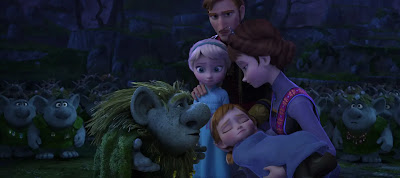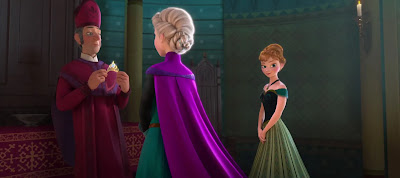The 53rd Disney animated feature film, Frozen was released on November 22nd, 2013. Written and directed by Chris Buck and Jennifer Lee it is inspired by Hans Christian Andersen's "The Snow Queen." It tells the story of Queen Elsa of Arendelle (Idina Menzel), who looses control of her ice creating powers resulting in a massive blizzard engulfing her kingdom. When a tormented Elsa flees into hiding it is up to her sister Anna (Kristen Bell) to help her see reason and save Arendelle from an eternal winter.
The Walt Disney studio had begun plans to adapt the works of Hans Christian Andersen as far back as 1937. By 1940 they had begun working on a co-production with Samuel Goldwyn about the life of the author. Disney would animate Andersen's fairy tales, including "The Snow Queen" while Goldwyn would shoot scenes from Andersen's life in live-action. This plans were put on hold during the Second World War, as the studio was focused on making propaganda films to support the war effort. After the war the Anderson biopic went ahead without Disney's involvement, and was released as a wholly live-action film in 1952.
"The Snow Queen" lay dormant at Disney until the late 1990s, when the studio, spurred on by the tremendous success of their Renaissance era films, began developing a new adaptation. This project too came to a halt in 2002, when Glen Keane left the project to work on Rapunzal (which eventually became Tangled). When John Lasseter was named the new head of the studio in 2006 he convinced his old friend Chris Buck to return to Walt Disney Animation Studios from Sony Pictures Animation. Buck pitched several ideas for new films to Lasseter, including a new concept for "The Snow Queen."
Production on the film began in 2011 after the success of Tangled. Buck's aim was to "to do something different on the definition of true love," something outside of the studios usual prince/princess romances. The writers struggled to update Anderson's story to fit this aim and to make it seem relatable to modern audiences. By March of 2012, when Jennifer Lee was brought on as a screenwriter, the process of crafting the films story had effectively collapsed. It was not until November of that year that a shooting script was finally completed, leaving the animators with less then a year to complete the film. In the meantime, the script continued to go through revisions, and it was not until June of 2013 that it was finally finished.
My first viewing of Frozen was a decidedly lukewarm experience. I didn't dislike it but I was confounded by the level of praise it was receiving. Seeing again after all the hype has died down has not improved my opinion of it, quite the reverse in fact. The script, as might be expected considering the chaotic writing process that went into it, is a a bit of a mess. The source of the conflict is Elsa's fear of her own powers, a fear which leads her to suppress said powers until her ability to control them is compromised. The films opening scene establishes the reason for her fear, but its all rather clunky.
When playing with her sister as a child, Elsa accidentally injures her sister with her magic. Their parents take Anna to a colony of trolls, whose leader, Grand Pabbie, is able to heal their daughter but, for some reason, must also alter her memory so that she has no relocation of her sisters magical abilities. Despite the Grand Pabbie's advising them that Elsa must learn to control her powers and his warning that fear will be her greatest enemy, her parents completely isolate her and do everything they can to suppress her powers. This is portrayed as a well meaning misinterpretation Grand Pabbie's advice on their part, but it is really a blatant disregarding of it. This flimsy and contrived backstory cripples the whole film and makes Elsa's isolation and fear more frustrating then tragic.
A subplot involves Anna finding true love (or does she) with a visiting prince named Hans (Santino Fontana), predictably falling in love at first sight, a fact that we are continuously reminded of throughout the film, to the point that it becomes obnoxious. Of course it turns out that Hans is manipulating Anna for his own ends, and hopes to take the throne of Arendelle for himself. Much has been made of this twist and the way it subverts to typical Disney romance. Little girls should not be taught that "love at first sight" is a reasonable foundation for a relationship, it is argued.
However the older Disney classics were firmly in the tradition of the old fairy tale and never meant to offer commentary on real world relationships, rather they presented an idyllic and largely symbolic stories meant to reveal deeper truths about the human experience. Men and women should not, generally, rush into marriage. Because of our flawed and fallen state, it takes time and effort to establish meaningful and loving relationships. However, this does not mean that we should reject the idea that there is someone special that we are meant to be with, for God in his infinite wisdom has decreed every truly good human relationship from eternity. It is this truth that the fairy tale reveals. In any case Anna's relationship with Sven, the films "sensible" alternative to Hans, is not particularly nuanced either.
Of course, the main purpose of the twist was to shift the focus from the romance to the sisterly relationship between Elsa and Anna. This is an idea I could easily get behind. Unfortunately it is a little lacking in execution. The main problem is that there is not enough screen-time between Elsa and Anna to really flesh out there relationship. After the accident that injured her sister, Elsa is kept away from Anna by their parents, and later of her own volition, in order to protect her. Anna, having had the memory of the accident and of her sisters powers erased, does not understand this but, nonetheless, continues to love her sister.
Later, when Anna finally finds her sisters frozen retreat and informs her of the fate of Arendelle, a confused and upset Elsa inadvertently injures her sister once again. Going to the trolls once again Anna is told that only an act of true love can save her. The resolution comes when Anna, to protect her sister from the treacherous Hans, sacrifices herself. This is the "act of true love" to which Grand Pabbie referred and allows Anna to be thawed out. This also makes Elsa realize that love is the key to controlling her powers. Again this is not a bad idea for a climax in principle, but it has not been set-up adequately to be satisfying. After all, Elsa does not learn to control her powers because of a loving relationship with her sister (the thing she has been deprived of since childhood) but by a heroic sacrifice, something that Elsa herself has done, albiet in a misguided fashion, in order to protect her sister.
The film does have some good music, both the songs by Robert and Kristen Anderson-Lopez and the score by Christopher Beck. As much as "Let it Go" was overplayed to the point of lunacy I have to admit that it is very well done song (it certainly helps to have a professional mezzo-soprano like Idina Menzel) and works well in the dramatic context of Anna's repressed powers finally finding release, as clumsily developed as that was. Indeed, all of the songs are well written and feature clever lyrics, from the bittersweet and tragic "Do You Want to Build a Snowman?" to, my personal favorite, the Sondheim-esque "In Summer", an ironic little ditty sung by the films comic relief, Josh Gad's aloof snowman Olaf.
Frozen is, maybe, the most broadway-esque musical in the Disney canon in its approach. The songs are presented as a natural extensions of conversation between the characters and reveal their emotional states. Take the scene where Anna finally confronts her sister, their increasingly heated conversation giving way to a reprise of "For the First Time in Forever" with Anna singing in a major key and Elsa in a minor key. This kind of thematic connection occurs again and again between the various musical numbers and even the instrumental score. Unfortunately the pop/rock instrumentals that accompany the songs do not blend well at all with Beck's orchestral score and the film is left feeling rather uneven as a result.
The film can be a little dull visually at times. The backgrounds largely consist of endless expenses of barren, empty landscape covered in a blanket of snow. To be fair this approach does lend itself well to the story, which is largely one of isolation and emotional repression, at least from Elsa's point-of-view. For the most part, however, the animation is consistently amazing. The interiors of the castle and the town of Arendelle are wonderfully vibrant filled with eye-popping detail. The facial work too, is remarkably expressive, and easily the best the studio had done with 3D animation up to that point. Also of note is the elaborate costume design. Frozen displays a level of detail in the costumes never before seen in an CG animated, a medium which, up to this point, had regulated itself to the generally more streamlined designs exemplified by The Incredibles.
The most impressive thing in the film is the way it animates snow. The studio wanted to create a tool that would provide snow effects without the need for switching between different methods and the effects team created a random snowflake generator that allowed them to generate over 2,000 unique snowflakes for the film. The animators also had to figure out how to believably portray the characters interactions with their snow filled landscape. To achieve this, software engineers used advanced mathematics and physics to create a snow simulator software application that could depict realistic snow in a virtual environment. Much research was done in order to make this all as convincing as possible and the results are seamless.
In the end, despite some amazing animation and some really memorable songs, Frozen, mostly thanks to its overstuffed script, never gels into a satisfying whole.
Score: 6/10













No comments:
Post a Comment